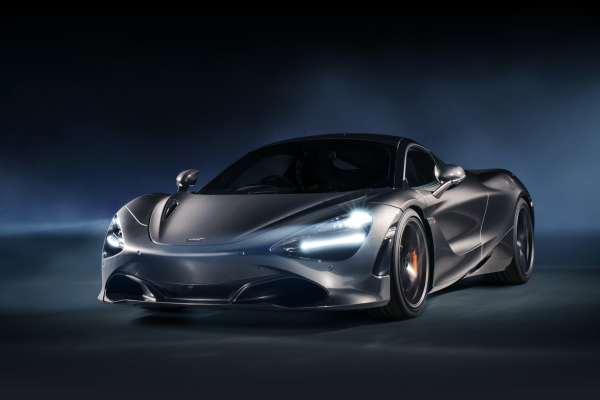Q
Is a 2019 McLaren GT fast?
The 2019 McLaren GT is truly a very fast luxury grand - tourer sports car. It's powered by a 4.0 - liter V8 twin - turbocharged engine, with a maximum output of 620 horsepower and a peak torque of 630 Nm. It can accelerate from 0 to 100 km/h in just 3.2 seconds and has a top speed of up to 326 km/h. Such performance figures are among the top in the GT segment.
For drivers in Malaysia, this car is not only suitable for long - distance trips but also offers an ultimate driving experience on the highways. It can really show off its performance advantages, especially on well - maintained roads like the North - South Expressway.
While maintaining high - performance, the McLaren GT has optimized its suspension system and interior comfort. It's more suitable for daily driving compared to traditional supercars. Its luggage space has reached 570 liters, making it more practical.
It's worth mentioning that the hot and rainy climate in Malaysia places high demands on the heat dissipation and tire performance of high - performance cars. The McLaren GT's heat dissipation system and tire configuration can well adapt to this environment, ensuring the vehicle can perform stably under various conditions.
If you're interested in this kind of high - performance GT models, you can also check out the Aston Martin DB11 or the Ferrari Roma in the same class. They each have their own characteristics, but the McLaren GT does an especially great job in balancing performance and practicality.
Special Disclaimer: This content is published by users and does not represent the views or position of PCauto.
Related Q&A
Q
What engine is in the 2019 McLaren GT?
In 2019, the McLaren GT was equipped with a 4.0-liter twin-turbocharged V8 engine. The engine code is M840TE, which can output 620 horsepower and 630 N·m of torque. Paired with a 7-speed SSG dual-clutch transmission, it only takes 3.2 seconds to accelerate from 0 to 100 km/h, and the top speed can reach 326 km/h. This engine features a lightweight design and optimized low-speed torque output, which better meets the requirements for the balance between comfort and performance of GT models. For car enthusiasts in Malaysia, this engine of the McLaren GT not only offers strong performance but also takes into account the practicality of daily driving. For example, its turbocharging system can provide abundant power at low speeds, making it very suitable for the winding roads and urban driving environment in Malaysia. McLaren's engine technology has always been at the leading position in the industry. This V8 engine also inherits the brand's racing genes. Meanwhile, through fine-tuning, it has improved fuel economy and emission performance, in line with the global environmental protection trend. It's worth mentioning that although this is a high-performance engine, McLaren has optimized the soundproofing and shock absorption technologies to ensure a luxurious and comfortable experience for the GT model, which is also what sets it apart from other supercars.
Q
How fast can a 2019 McLaren GT go?
The 2019 McLaren GT can reach a top speed of 326 km/h (about 203 mph), and it only takes 3.2 seconds to accelerate from 0 to 100 km/h. This car is equipped with a 4.0-liter V8 twin-turbocharged engine, with a maximum output power of 620 horsepower and a torque of 630 Nm. Combined with a 7-speed dual-clutch transmission, its performance is truly outstanding. As a luxury GT sports car, it offers a comfortable driving experience while maintaining high performance, making it suitable for long-distance trips. The interior is made of high-quality materials and is rich in technological features.
For car enthusiasts in Malaysia, the powerful performance and elegant design of the McLaren GT make it a great fit for the local high-end automotive market. It can really show off its excellent performance on the highways. However, it should be noted that the road conditions and traffic regulations in Malaysia may limit its top - speed performance. It is recommended to experience its full potential on a legal race track.
In addition, the maintenance cost of the McLaren GT is relatively high. Potential buyers need to understand the relevant expenses in advance to ensure the long - term cost - effectiveness of using the vehicle.
Q
How much is a 2019 McLaren GT?
The second-hand price of the 2019 McLaren GT in the Malaysian market is approximately between RM800,000 and RM1.2 million. The specific price depends on factors such as the vehicle's condition, mileage, configuration, and whether it is officially certified. As a GT sports car that combines luxury and performance, it is equipped with a 4.0-liter V8 twin-turbocharged engine, which can output 620 horsepower. It can accelerate from 0 to 100 km/h in just 3.2 seconds. At the same time, it offers a more comfortable driving experience and practicality compared to traditional supercars. When buying this kind of high-performance sports car in Malaysia, it is recommended to make the transaction through official dealers or well-reputed used car dealers to ensure that the vehicle source is reliable and that you can enjoy comprehensive after-sales services. In addition, you also need to consider import duties, insurance, and maintenance costs. The annual maintenance cost of this kind of supercar can be as high as tens of thousands of ringgit. Beyond price considerations, potential buyers should arrange test drives to experience its unique driving dynamics and familiarize themselves with local regulations governing high-performance vehicles.
Popular Cars
Model Year
Car Compare
Car Photo
Latest Q&A
Q
How to tell if a car needs an air filter?
To determine whether a car's air filter needs replacement, a multi-dimensional comprehensive assessment can be conducted. First, perform a visual inspection: after removing the filter, if the filter paper appears uniformly gray-black, shows oil stains or stubborn dirt deposits, or exhibits physical damage such as tears or deformation, immediate replacement is required. Second, monitor the vehicle's performance: symptoms like abnormal fuel consumption increase, starting difficulties, sluggish acceleration, blackened exhaust emissions, or illumination of the engine warning light may indicate restricted airflow due to filter clogging. Furthermore, operating conditions significantly affect filter longevity. For vehicles regularly driven in harsh environments like sandy or construction zones, early inspection and replacement are advised even before reaching the standard 15,000-30,000 kilometer service interval. Practically, you may lightly tap the filter to assess dust accumulation or use reverse-flow compressed air cleaning to evaluate residual contamination. Replacement is mandatory if the filter media structure is compromised or the sealing gasket shows aging. Regular filter inspections every 5,000 kilometers are recommended to maintain optimal engine air intake efficiency and combustion stability.
Q
When to know to change air filter in car?
The replacement cycle of a car's air filter needs to be comprehensively considered based on driving mileage, usage environment, and manufacturer's recommendations. It is usually recommended to replace it every 10,000 to 15,000 kilometers driven or once a year. If the vehicle is often driven in harsh environments such as dusty areas, hazy conditions, or rural roads, the replacement interval should be shortened to every 5,000 to 8,000 kilometers or every 3 to 6 months. For highway driving, the interval can be extended to 20,000 to 30,000 kilometers. Dry filters (adopted by mainstream models) can be cleaned of light dirt with compressed air, but they need to be replaced immediately if severely dirty or damaged. A clogged filter will lead to insufficient air intake and reduced combustion efficiency, manifesting as decreased power, increased fuel consumption, and unstable idling. The maintenance manuals of different brand models may vary; for example, some turbocharged models have higher requirements for air cleanliness and need more frequent replacement. It is recommended to check the filter status during each maintenance, especially after rainy seasons or sand and dust weather, to ensure the engine's optimal performance and extend its service life.
Q
How often do you need to change your car air filter?
The replacement cycle of a car's air filter should be flexibly adjusted according to the driving environment and usage conditions. The general recommendation is to replace it every 10,000 to 15,000 kilometers or 12 months, whichever comes first. If the vehicle is frequently driven in dusty, gravelly, or heavily polluted areas such as construction sites or industrial zones, it is recommended to shorten the replacement interval to every 5,000 to 8,000 kilometers or 3 to 6 months; in extreme cases, the filter should be inspected every 3,000 kilometers and replaced promptly if necessary. In humid coastal areas, extra attention should be paid to filter moisture or mold growth, and an inspection every 3 to 4 months is advised. Routinely, you can determine the replacement timing by observing whether the filter has darkened, accumulated excessive dust, or shows reduced light permeability. If the engine exhibits symptoms like power loss, abnormally increased fuel consumption, or unstable idling, the filter condition should be prioritized for inspection. For turbocharged models, it is recommended to increase the inspection frequency and prioritize the use of original equipment manufacturer (OEM) filters to ensure optimal filtration performance. If the filter becomes damp after driving through water, it must be replaced immediately to prevent the paper structure from swelling and obstructing the air intake. Regular maintenance of the air filter not only protects the engine from dust-induced wear but also optimizes fuel efficiency and power output. Car owners are advised to incorporate filter inspection into routine maintenance and develop a customized replacement schedule based on the manufacturer's manual and actual driving conditions.
Q
Is an air filter necessary?
The air filter is an indispensable key component in the automobile engine system. Its main function is to filter out solid impurities such as dust, sand particles, and pollen from the air entering the engine, preventing these particles from entering the cylinder and causing abnormal wear of the piston group and cylinder wall, thereby avoiding serious mechanical failures such as "cylinder scuffing". Through multiple filtration mechanisms including interception and electrostatic adsorption, it ensures the engine receives clean air, maintaining the optimal air-fuel ratio, improving combustion efficiency, reducing fuel consumption and exhaust emissions, while also minimizing intake noise and enhancing driving comfort. Depending on the vehicle's operating environment, it is recommended to replace the filter element every 15,000 kilometers. For vehicles frequently driven in dusty or sandy areas, the replacement interval should be reduced to within 10,000 kilometers. A clogged filter left unchanged for an extended period will result in increased intake resistance, diminished engine power, higher fuel consumption, and may even cause operational instability issues like engine vibration. Currently, the replacement cost for air filters in standard vehicle models ranges between 50 to 100 Malaysian Ringgit. Regular maintenance not only prolongs engine lifespan but also optimizes overall vehicle performance.
Q
How often should you change your air filter?
The replacement cycle of a car's air filter should be determined based on both the vehicle's operating environment and the manufacturer's recommendations. Generally, it is recommended to replace the filter every 10,000 to 15,000 kilometers or annually. For vehicles frequently driven on highways in clean environments, the interval may be extended to 20,000 to 30,000 kilometers. Conversely, in harsh conditions such as dusty, polluted, or rural areas, the replacement interval should be reduced to 5,000 to 10,000 kilometers or every 2 to 3 months. Dry-type filters (commonly used in mainstream vehicles) can be cleaned with compressed air when lightly soiled, but must be replaced if heavily contaminated to prevent issues like restricted airflow, incomplete combustion, power loss, and increased fuel consumption. Since maintenance requirements vary by brand and model, always consult the specific instructions in the vehicle owner's manual. Regular inspection and timely replacement of the air filter will help maintain engine performance and prolong its lifespan.
View More












Pros
Cons